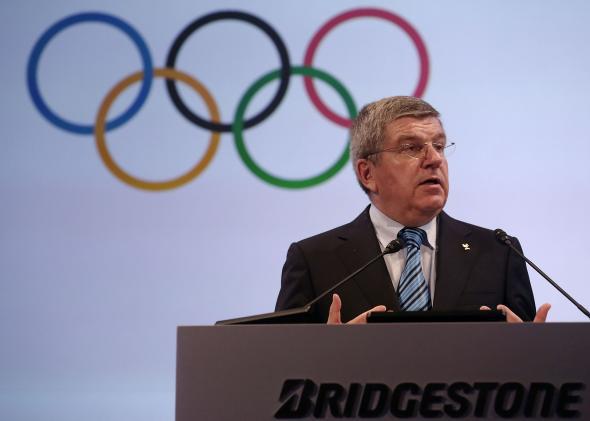The Associated Press reports today that the International Olympic Committee has decided to include new language in host city contracts that will require the cities and national Olympic committees of their countries to adhere to Principle 6 of the Olympic Charter, which bans discrimination in sport. Despite the fact that sexual orientation and gender identity are not explicitly protected in the clause’s language (unlike race, nationality, gender, etc.), advocacy organizations like Athlete Ally and All Out are praising the move as a great improvement from the 2014 Sochi games, during which Russia’s “gay propaganda” laws drew criticism from LGBTQ and human rights groups around the world.
Yet nothing in this announcement can guarantee any real protection for LGBTQ people. While All Out may claim that “This clause will ensure that future host cities must abide by international human rights standards in order to host the games, including the protection of lesbian, gay, bisexual and transgender citizens and athletes,” this is more wishful thinking than reality. For that kind of protection to be certain, the IOC must explicitly include sexual minorities in its Charter or host city contract—and, more important, provide a means of enforcing such commitments.
Other groups, like the Federation of Gay Games in its Principle 5 Campaign (until recently, the Olympic Charter’s non-discrimination clause was number 5 in the document) and Pride House International, have called for clearer commitments. Before and during the Sochi Olympics, Jacques Rogge and Thomas Bach, Rogge’s successor as president of the IOC, stated that sexual orientation was implied in the scope of Principle 6; Pride House International believed that that was not enough and that the Olympic Charter should be revised to make that inclusion explicit.
Lou Englefield, an LGBTQ sports advocate and director of Pride Sports UK, sees the most recent change as a positive but insufficient step: “I find it disappointing that the IOC did not revise Principle 6 of the Olympic Charter to include sexual orientation and gender identity at this time. This is a missed opportunity for truly inclusive leadership in the governance of global sport.”
Indeed, it is hard to see what has changed: Were host cities not already obliged to respect the Olympic Charter? If this is the only change with regard to human rights to come out of the Bach’s Agenda 2020 process of Olympic reform, to be approved by IOC members this December, then serious human rights advocates will have cause to be disappointed.
Various groups, including some European national Olympic committees and Human Rights Watch, have made submissions calling for human rights of all kinds to be part of the bidding process and beyond. The Federation of Gay Games, in its submission to the Agenda 2020 reform process, asked that an evaluation of the status of human rights, and in particular the existence of official and unofficial discrimination in a potential host country, be part of the Olympic bidding process; that the existence in a potential host country of legal discrimination on the basis of the criteria set out in the Olympic Charter disqualify potential host countries; and more important, that the IOC include in its contractual documents with hosts appropriate mechanisms to enforce human rights commitments. The FGG observed that “the IOC must be at least as committed to respecting the human rights as it is to protecting intellectual property and marketing rights during the Olympic Games.”
There is so much more to do. Beyond what happens at the Olympics, the IOC needs to take on homophobia in member countries. The change in the host city contract is a positive sign, but until a serious review of human rights is part of the bidding process, until an objective monitoring of the respect of human rights commitments is in place, and until an effective mechanism for sanctioning the failure to respect those commitments exists, there will be no level playing field for LGBTQ athletes. This race ends in December with the vote on Agenda 2020; if LGBT advocates take a victory lap now, they’ll fail to help the IOC reach its goal.
